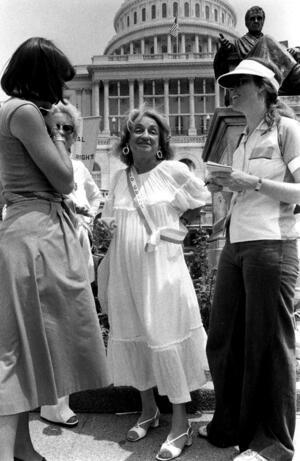Betty Friedan
The news of Betty Friedan’s death made me feel that I had a lost an old and dear friend—and for many women everywhere, so we had. If there was any one woman who could be called the mother of feminism, it was Betty Friedan. Though “second-wave” feminism was a collective endeavor that had many founders, Friedan was the spark plug whose furious indictment of “the problem that had no name”—the false consciousness of “happy housewifery”—set off a revolution more potent than many of the other social and cultural upheavals of the 1960s. The impact of this social movement is still being felt around the world.
Friedan’s The Feminine Mystique had an immediate effect upon me. Graduating college in 1963, when the book first appeared, I was so intrigued by Friedan’s powerful critique of domesticity, that I bought a hard-cover copy for my mother, inscribing it to her with a not-too-subtle hint that I hoped the book would inspire her to change her life. Like many rebellious younger women, I was convinced, in good part by Friedan, that our mothers’ seemingly comfortable but narrow lifestyles had been a terrible choice, one that we would not follow.
Some 20 years later, when I was chairing the Women’s Studies program at Brandeis University, Friedan came to speak. Still feisty and confrontational, she challenged our students not to think so narrowly about the career pathway she had once advised. “Was the feminine mystique” a mistake, she was asked; at that point in her life, worrying whether her daughter in medical school could combine her future career with motherhood, she felt it might have been. Some feminists accused Friedan of abandoning the feminist vision she had done so much to promulgate, but she argued in new work, like The Second Stage, that her vision required the participation of men and needed to incorporate the desires of women for family as well as work. Though the issue of career-vs. stay-at-home motherhood has been framed in more complex fashion by economists, sociologists, and others who look carefully at workplace inequities as well as unequal burdens of parenting, the dilemma Friedan raised as she acknowledged her “mistake” remains deeply relevant to contemporary women.
Friedan admitted that she made another mistake in regard to her Jewish identity. Early in life, she rejected religion almost entirely, but feminism brought her back to reclaim her Jewish roots and she did so proudly. When I was working on my book, The Journey Home, in the mid-1990s, I had been warned of Friedan’s notorious refusal to allow scholars to quote from her papers, even though many of these, held at the Schlesinger Library in Cambridge, Massachusetts, were open to the public. The librarians there gently suggested that Friedan would turn down my request to quote from her work as she had turned down many others. But when I asked Friedan for permission to cite only those lines from her private diaries that linked her directly to her Jewish identity, her reaction was swift and positive. Friedan very much wanted to publicly proclaim her identity as a feminist—and as a Jewish woman—and she appreciated my effort to make that connection.
In my book, I chronicle the story of Friedan’s journey to feminism (see excerpted chapter)—a journey much influenced by the double marginality she experienced growing up Jewish and female. The “second stage” in this journey is the route Friedan took to becoming in her words, a “Jewish American feminist.” This, too, is a profound and powerful story.
More on Betty Friedan, 1921 - 2006
- Encyclopedia Article: Midge Decter
- Encyclopedia Article: Betty Friedan
- Encyclopedia Article: Harriet Fleischl Pilpel
- This Week in History: Publication of "The Feminine Mystique" by Betty Friedan
- This Week in History: Meetings held to plan National Organization for Women



